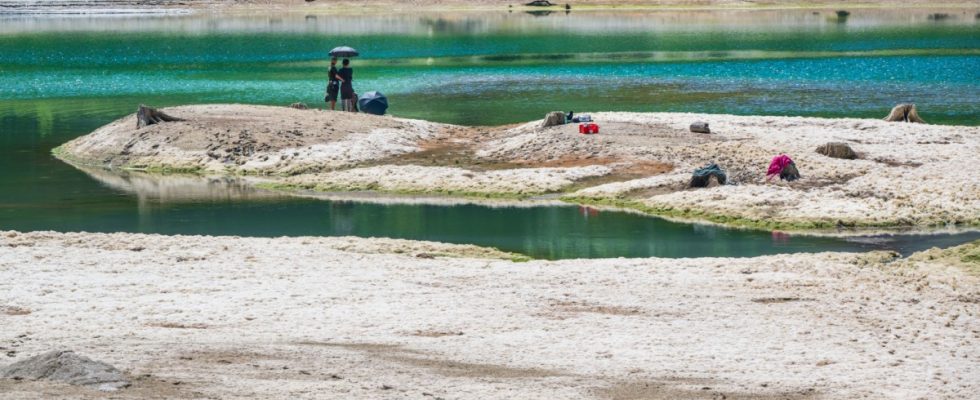A quick look at the current low-water report, which provides information about the situation of the groundwater, but also of the lakes and rivers in Bavaria: As of June 20, 47 percent of the near-surface groundwater measuring points in the Free State reported low or very low values. Most of the drinking water in Bavaria is obtained from the near-surface groundwater. In the case of deep groundwater, which is the iron water reserve of the Free State, so to speak, it was even 69 percent. And this despite the fact that it rained comparatively much this spring. After weeks of summer weather, the situation is again as dramatic as in June 2022 – the previous record month in terms of low water. Many streams, rivers and lakes now also have very little water. The reason is the climate crisis with its increasingly violent heat and dry periods.
The Greens in the state parliament presented the draft of a Bavarian water security law on Thursday. With it, they want to ensure comprehensive protection of the groundwater and thus the shrinking drinking water supplies in Bavaria. “Our water is our most valuable asset,” said Green Party leader Ludwig Hartmann. “Securing it has top priority – from exploitation by corporations, from pollution and waste and from the Söder government.”
Hartmann makes it clear that the Greens initiative is also the direct answer to the round table on water by Prime Minister Söder and Environment Minister Torsten Faithr a week ago. The CSU boss and the FW politician presented plans for a national drinking water distribution network from Lake Constance to Franconia. This is intended to ensure the drinking water supply, especially in northern Bavaria, even if the climate crisis continues to worsen. From Hartmann’s point of view, the round table was “a pure PR show” – the protection of water supplies and provision for the future must be much more comprehensive than such a large-scale project designed to last decades.
With their legislative initiative, the Greens are primarily targeting two open water management construction sites in Bavaria. On the one hand, there is the enlargement of the water protection areas, which many experts consider to be overdue. Bavaria is one of the federal states with the smallest water protection areas. Only five percent of the country’s area is classified as such. In Baden-Württemberg, for example, it is 27 percent, in Hesse even 38 percent. If Hartmann and his group have their way, the extent of the water protection areas in Bavaria should at least double by 2030 – to a total of twelve percent of the state area. The protection of the deep groundwater is also to be improved. It should remain as untouched as possible, and if not, then primarily serve the public drinking water supply.
An enlargement of the water protection areas and the water cent are the central points in the water security law of the Greens, which the parliamentary group leader Ludwig Hartmann has now presented.
(Photo: Daniel Löb/dpa)
The other open construction site is the water cent. Here, too, the Greens want to get down to business. When it comes to water cents, Bavaria is also one of the tail lights in Germany. 13 of the 16 federal states demand fees for the extraction of groundwater – from private consumers, farmers, trade and industry of all kinds, energy companies and the like. In the past, the state government has repeatedly announced that it also intends to introduce a “water withdrawal fee”, as the water cent is officially called. Ultimately, however, she always gave up. The Greens now want to charge a fee of eight cents for the promotion of a thousand liters of groundwater close to the surface, and one euro for a thousand liters of deep groundwater. For comparison: A liter of mineral water costs 17 cents and more in the supermarket. According to the Greens, the proceeds from the water cent should be used for water protection.
In addition, many smaller points are to be laid down in the law, for example the priority of the local, decentralized drinking water supply, which is common in Bavaria, over long-distance pipelines as in Söder’s and Glauber’s new concept. Or a central water extraction register that lists who is pumping how much groundwater from the ground and where. So far, such a register is missing. The result: no one has an overview of how much groundwater is pumped in Bavaria day in, day out. From Hartmann’s point of view, such an overview is crucial “so that we can manage our dwindling groundwater reserves as economically and sustainably as possible”.

